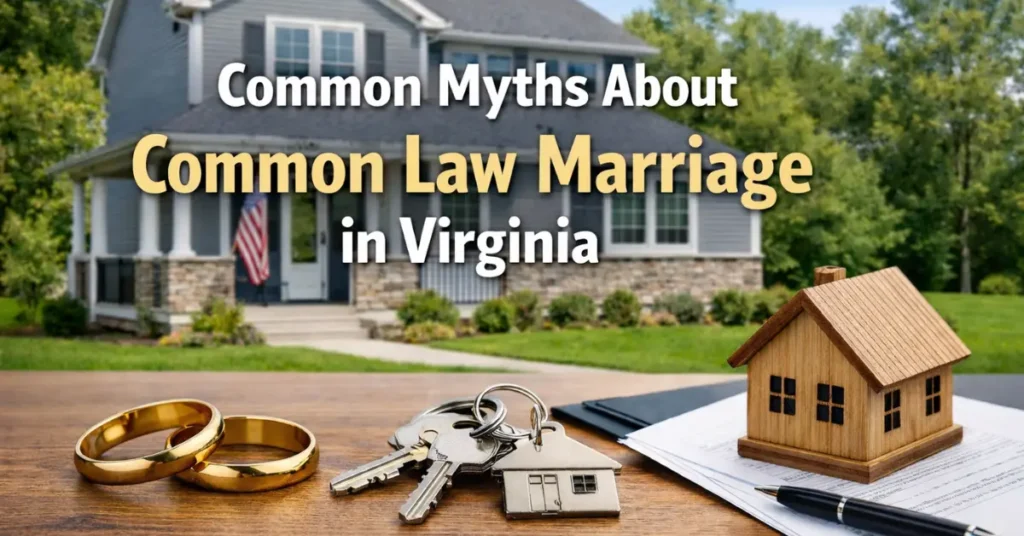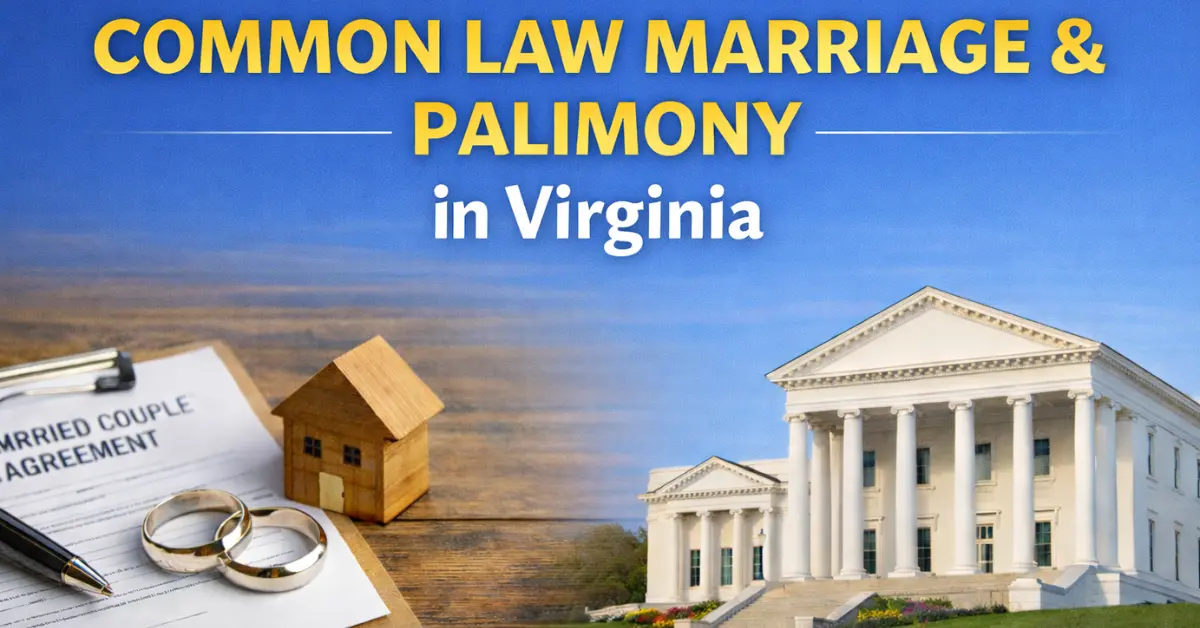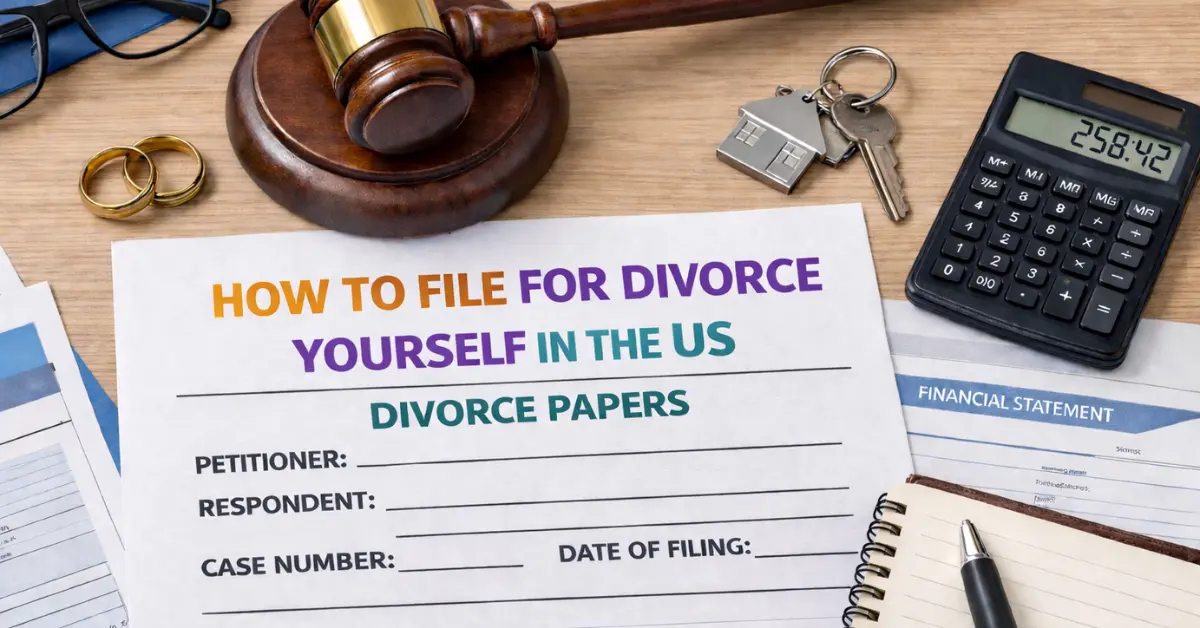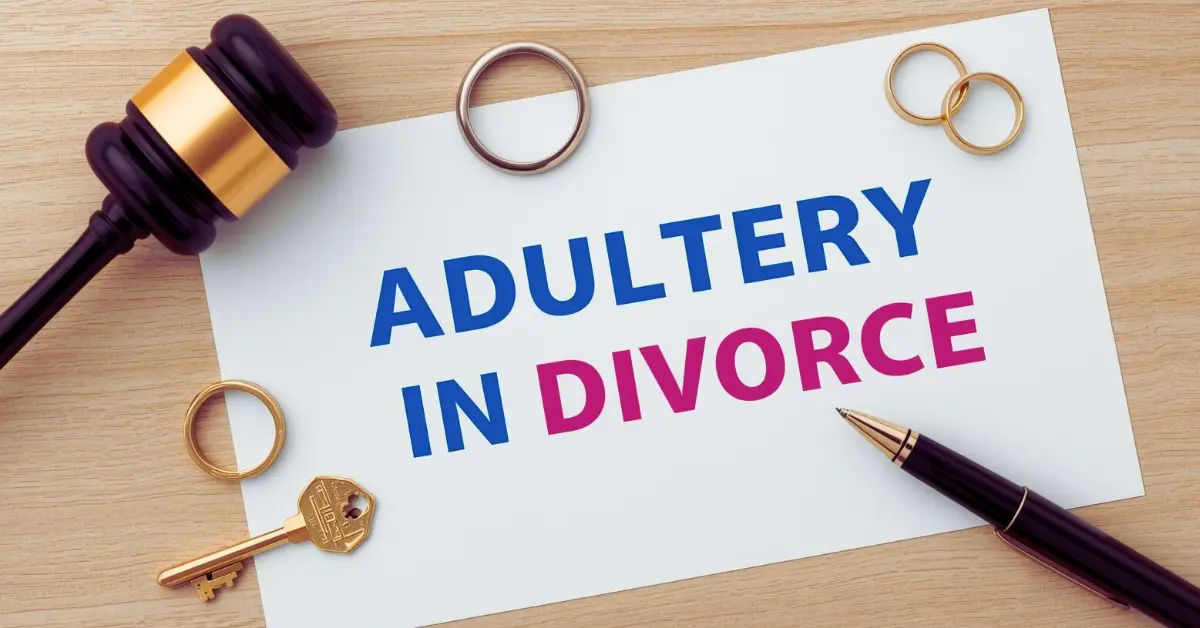Common law marriage and palimony are terms often misunderstood in Virginia. Common marital law refers to a relationship where a couple lives together and presents themselves as married without a formal marriage license.
Palimony, on the other hand, is a form of financial support one partner may seek from another after a relationship ends, similar to alimony but applicable to unmarried couples.
In Virginia, the legal landscape surrounding these concepts can be confusing. The state does not recognize common law marriage established after January 1, 2017, meaning that couples who have been living together may not have the same legal status as married couples.
This article aims to clarify these concepts and debunk common myths surrounding them, ensuring that Virginia residents understand their rights and obligations.
Is Common Law Marriage Recognized in Virginia?
Virginia does not recognize common law marriage for relationships established after January 1, 2017. This means that if a couple has lived together for several years without a formal marriage, the state will not recognize them as married under the law.
However, couples who established a common marital law in another state before moving to Virginia may have their marriage recognized.
This recognition hinges on whether the marriage met the legal requirements of the state where it was established.
Couples must show that they lived together, intended to be married, and presented themselves as a married couple to others.
Key Legal Requirements for Marriage Recognition in Virginia
- Intent to Marry: Both partners must intend to enter into a marital relationship.
- Public Presentation: The couple must present themselves as married in public.
- Duration of Cohabitation: While no specific time frame is set, longer periods of cohabitation strengthen the claim.

Common Myths About Common Law Marriage in Virginia
There are many myths about common law for marriage in Virginia. Some believe that simply living together for a certain period, such as a year, automatically grants them a marital status. This is not true. In Virginia, merely cohabitating does not create a marriage.
Another common misconception is that common marital law is available to anyone who wishes to have a marriage without the formalities.
In reality, the criteria for common law marriage are stringent and vary from state to state. In Virginia, a couple’s legal standing is not altered by simply choosing to live together without a formal marriage.
What Does Not Qualify as Common Law Marriage in Virginia
- Living Together: Simply sharing a home does not create a legal marriage.
- Duration Alone: There is no magic number of years that makes a couple married.
- Joint Bank Accounts: While this can indicate a commitment, it is not legally binding as a marriage.
Palimony: What Is It and How Does It Apply in Virginia?
Palimony is a term that describes the financial support one partner may seek after a non-marital relationship ends.
Unlike alimony, which is awarded to a spouse after divorce, palimony applies to couples who were never legally married. In Virginia, the rules regarding palimony are less clear, as there is no specific law governing it.
For a partner to be eligible for palimony, they typically must demonstrate that:
- There was a financial dependency established during the relationship.
- There was a verbal or written agreement regarding financial support, similar to what would occur in a marital relationship.
The absence of a formal contract can complicate claims for palimony. Courts in Virginia will examine the nature of the relationship and the evidence presented to determine if a claim for palimony is valid.

Alternatives to Common Law Marriage in Virginia
Given the lack of recognition for common law marriage in Virginia, couples often seek alternatives to establish legal protections for their relationships. Here are a few options:
- Domestic Partnerships
Some local jurisdictions in Virginia may offer domestic partnership registrations, granting certain legal rights to unmarried couples.
- Cohabitation Agreements
Couples can create a legal contract outlining their rights and obligations while living together. This agreement can address issues like property rights and financial support.
- Wills and Estate Planning
Unmarried couples should consider drafting wills to ensure their partner inherits property and assets, as they may not have automatic rights under Virginia law.
- Power of Attorney
Designating a partner as a power of attorney can provide essential legal authority in healthcare and financial matters if one partner becomes incapacitated.
Benefits and Limitations of These Arrangements
- Benefits
Legal agreements can provide clarity and protect both partners’ interests in the event of a separation or death.
- Limitations
Not all agreements are enforceable, and specific legal requirements must be met for them to be valid.
Key Legal Cases Impacting Common Law Marriage and Palimony in Virginia
Common law marriage has long been a subject of discussion and misunderstanding in many states, including Virginia.
In Virginia, common law for marriage is not recognized. This means that simply living together for a certain period does not automatically grant partners the rights of a married couple.
One significant case that impacted the understanding of common law for marriage is Morris v. Morris.
In this case, the court ruled that for a common law for marriage to exist, specific elements must be present, including an intention to be married and cohabitation.
Since Virginia does not recognize common marital law, couples must take extra steps to secure legal rights typically associated with marriage.
Additionally, the issue of palimony arises when partners who live together but are not married separate. The term refers to financial support one partner may seek from the other after a relationship ends.
While Virginia courts have occasionally acknowledged palimony claims, they usually rely on contractual agreements or circumstances similar to marriage. The lack of established common law for marriage makes the situation even more complex.
In recent years, some courts have considered cases involving cohabitating couples seeking financial support after separation. However, without clear precedents for common law for marriage, outcomes can vary greatly based on the specifics of each case.
Couples in Virginia should be aware that while they may have some legal rights, those rights do not extend to common marital law or palimony unless they have a formal agreement in place.
What to Do if You’re Unmarried and Want Legal Protection
For unmarried couples in Virginia, it is crucial to take proactive steps to ensure legal protection of assets and rights. Here are some effective strategies:
Cohabitation Agreements
One legal instrument that describes the rights and obligations of cohabitating partners is a cohabitation agreement. It may address a number of subjects, including:
- Division of property
- Financial obligations
- Child custody and support arrangements
Creating a cohabitation agreement helps clarify expectations and can provide a framework for resolving disputes if the relationship ends.
Wills and Estate Planning
Unmarried couples should consider drafting wills to specify how their assets will be distributed upon death.
In Virginia, without a will, assets may be distributed according to state law, which may not align with the deceased’s wishes. A well-structured will ensures that both partners’ interests are protected.
Financial Arrangements
Couples can also explore financial arrangements, such as joint bank accounts or property ownership. Having both partners’ names on property titles can provide legal rights in case of separation or death.
Consulting a Family Law Attorney
Given the complexities of Virginia’s laws regarding typical law for marriage and palimony, it is wise for unmarried couples to consult a family law attorney.
An attorney can provide guidance tailored to their specific situation, ensuring that both partners understand their rights and can make informed decisions.
Conclusion
In summary, understanding the intricacies of common marital law and palimony is vital for unmarried couples in Virginia. With Virginia not recognizing common law marriages, couples must take proactive steps to protect their rights and assets.
Creating cohabitation agreements, drafting wills, and seeking legal advice are essential strategies for ensuring both partners are safeguarded.
As the landscape of family law continues to evolve, staying informed and legally prepared can help couples navigate their relationships more effectively.
Couples are encouraged to engage with legal professionals to develop a comprehensive understanding of their rights and responsibilities in the absence of traditional marriage.
For any couple living together in Virginia, being proactive about legal protections is not just wise—it’s necessary. Make informed decisions today to secure a more stable future.




